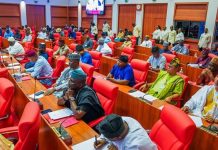Joseph Ifeanyi moved swiftly through the thick, dirty waters that had submerged a part of his neighborhood at Infant Jesus Area of Asaba, the capital of Delta State. Soon, the odoriferous smell of the dark-coloured, stinking water took over the atmosphere. If Mr Joseph was disturbed by the offensive smell, he didn’t care to show it. It was in the last week of October when devastating floods submerged many states across Nigeria, with disastrous consequences for Delta communities, especially those on the bank of the River Niger.
“Many people left this neighborhood when the waters came,” Mr Joseph began, stifling a tear.
“Many of the houses around here have been submerged in water and destroyed by the flood. There are reported cases of death in Asaba and other parts of Delta already. Many of our neighbors are now at IDP Camps in Ogbe-Afor. We don’t even know where others are as we speak. It’s a very sad situation.”
Mr Joseph soon moved to the bank of the Anwai river channel, ostensibly to go check his fishing net. He told this reporter that since the floods submerged the neighborhood, residents have vacated their houses and the few people who have remained sought relief in mundane activities such as fishing inside the makeshift pond on the bank of the river channel.
“We cannot go to IDP camp; well, I personally can’t go there because it’s not convenient,” he said.
“Since the waters have covered everywhere, we now fish on our street here and we ‘catch’ fishes and other things these days. Maybe it’s the flood that brought them here. Our fear is just about a disease outbreak from floodwater because some people in the neighborhood use the water to do house chores.”
Mr Joseph’s neighbourhood is located close to the teaching and research farm of the Delta State University’s Faculty of Agriculture, Anwai, Asaba
Source: premiumtimesng.com









